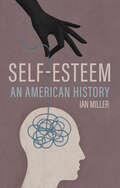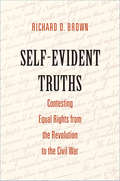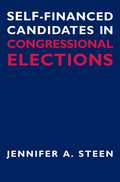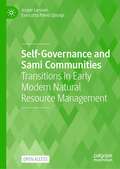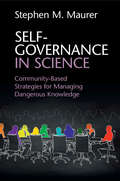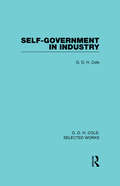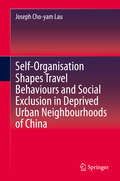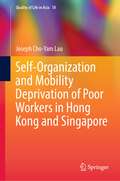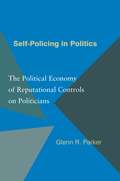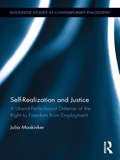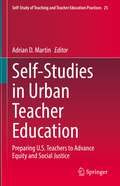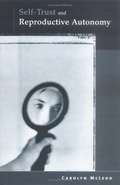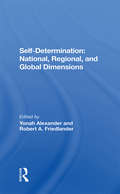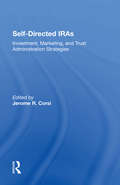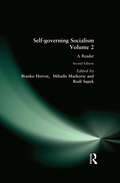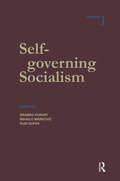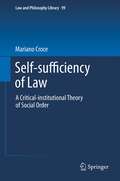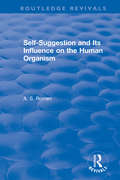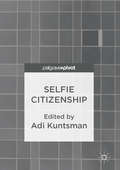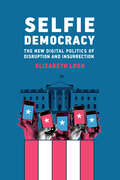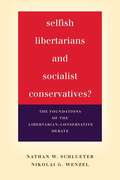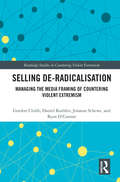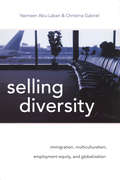- Table View
- List View
Self-Esteem: An American History
by Ian MillerAt the end of the last century, the idea of self-esteem became enormously influential. A staggering amount of psychological research and self-help literature was published, and before long was devoured by readers. Self-esteem initiatives permeated American schools. Self-esteem became the way of understanding ourselves, our personalities, our interactions with others. Nowadays, few people think much about the idea of self-esteem—but perhaps we should.Self-Esteem: An American History is the first historical study exploring the emotional politics of self-esteem in modern America. Written with verve and insight, Ian Miller’s expert analysis explores the critiques of self-help which accuse it of propping up conservative agendas by encouraging us to look solely inside ourselves to resolve life’s problems. At the same time, he reveals how African American, LGBTQ+ and feminist activists endeavored to build positive collective identities based upon self-esteem, pride and self-respect.This revelatory book will be essential reading for anyone with an interest in the history of mental health, well-being, emotions in the United States’ unique society and culture.
Self-Evident Truths: Contesting Equal Rights from the Revolution to the Civil War
by Richard D. BrownFrom a distinguished historian, a detailed and compelling examination of how the early Republic struggled with the idea that "all men are created equal" How did Americans in the generations following the Declaration of Independence translate its lofty ideals into practice? In this broadly synthetic work, distinguished historian Richard Brown shows that despite its founding statement that "all men are created equal," the early Republic struggled with every form of social inequality. While people paid homage to the ideal of equal rights, this ideal came up against entrenched social and political practices and beliefs. Brown illustrates how the ideal was tested in struggles over race and ethnicity, religious freedom, gender and social class, voting rights and citizenship. He shows how high principles fared in criminal trials and divorce cases when minorities, women, and people from different social classes faced judgment. This book offers a much-needed exploration of the ways revolutionary political ideas penetrated popular thinking and everyday practice.
Self-Financed Candidates in Congressional Elections
by Jennifer A. SteenAre our elections for sale?
Self-Governance and Sami Communities: Transitions in Early Modern Natural Resource Management
by Jesper Larsson Eva-Lotta Päiviö SjaunjaThis open access book uses an interdisciplinary approach that not only focuses on social organization but also analyzes how societies and ecological settings were interwoven. How did early modern indigenous Sami inhabitants in interior northwest Fennoscandia build institutions for governance of natural resources? The book answers this question by exploring how they made decisions regarding natural resource management, mainly with regard to wild game, fish, and grazing land and illuminate how Sami users, in a changing economy, altered the long-term rules for use of land and water in a self-governance context. The early modern period was a transforming phase of property rights due to fundamental changes in Sami economy: from an economy based on fishing and hunting to an economy where reindeer pastoralism became the main occupation for many Sami. The book gives a new portrayal of how proficiently and systematically indigenous inhabitants organized and governed natural assets and how capable they were in building highly functioning institutions for governance.
Self-Governance in Science: Community-Based Strategies for Managing Dangerous Knowledge
by Stephen M. MaurerCommercial and academic communities use private rules to regulate everything from labor conditions to biological weapons. This self-governance is vital in the twenty-first century, where private science and technology networks cross so many borders that traditional regulation and treaty solutions are often impractical. Self-Governance in Science analyzes the history of private regulation, identifies the specific market factors that make private standards stable and enforceable, explains what governments can do to encourage responsible self-regulation, and asks when private power might be legitimate. Unlike previous books which stress sociology or political science perspectives, Maurer emphasizes the economic roots of private power to deliver a coherent and comprehensive account of recent scholarship. Individual chapters present a detailed history of past self-government initiatives, describe the economics and politics of private power, and extract detailed lessons for law, legitimacy theory, and public policy.
Self-Government in Industry (Routledge Library Editions)
by G D ColeThis book represents an important stage in the development of an indigenous theory. The argument is presented with the special qualities of cogency and perception which have given the author a lasting influence within the labour movement.
Self-Organisation Shapes Travel Behaviours and Social Exclusion in Deprived Urban Neighbourhoods of China
by Joseph Cho-yam LauThis book investigates the influence of self-organisation processes on the commuting of the poor workers in urban China. It suggests a new approach to investigate and measure individual access, and it argues that dynamic interactions between individual action and social structure influence individual’s access to transport, which cannot be measured using other traditional accessibility approaches.The overwhelming majority of models in transport research assume that socio-economic factors and the built-environment influence the accessibility of transport for individuals. This book provides evidence that individual decision-makings and actions are also vital factors to bring out changes in accessibility. Further, the study adopts a self-organisation process and structuration theory to illustrate that a significant proportion of travel problems of migrants are rooted in the interaction between actions and social structures. Any change in migrants’ actions or social structures in the self-organisation process would result in the production of complex and spontaneous travel behaviour. The self-organisation approach presented provides a new approach for urban transport planning in the future, particularly on the investigation of the accessibility of disadvantaged social groups. By using the social theories, transport research can have an effect on commuting behaviour and to improve poor workers’ quality of life.
Self-Organization and Mobility Deprivation of Poor Workers in Hong Kong and Singapore (Quality of Life in Asia #18)
by Joseph Cho-Yam LauThis book focuses on the influence of socio-economic and land-use policies on the commuting problems and quality of life of the poor in Singapore and Hong Kong. It considers the influence of self-organisation: how the mobility of an individual is constituted by structures such as transport systems or socio-economic structural factors, as well as influenced by individual decisions. Where most transport studies focus on the influence of factors such as income inequality, the gender gap, and the built environment, this book fills a gap in paying particular attention to the influence of individual decisions on commuting. Given the prevalence of the former in research, government decision-makers are often constrained by these approaches and fail to understand the commuting problems of the poor. This book argues that the self-organisation approach provides some ideas that are outside the common conceptual framework in conventional transport planning and looks to improve mobility of lower-income commuters. Relevant to social science researchers working in areas such as urban planning and transport, mobility deprivation, and poverty, this book breaks new ground in quality of life studies in the Singapore and Hong Kong contexts.
Self-Organizing Federalism: Collaborative Mechanisms to Mitigate Institutional Collective Action Dilemmas
by Richard C. Feiock John T. ScholzThis book investigates the self-organizing responses of governments and interests to the institutional collective action (ICA) dilemmas of particular concern to students of federalism, urban governance, and regional management of natural resources. ICA dilemmas arise in fragmented systems whenever decisions by one independent formal authority do not consider costs or benefits imposed on others. The ICA framework analyzes networks, joint projects, partnerships, and other mechanisms developed by affected parties to mitigate ICA decision externalities. These mechanisms play a widespread but little-understood role in federalist systems by reshaping incentives in order to encourage coordination/cooperation. The empirical studies of urban service delivery and regional integration of regional resource management address three questions: How does a given mechanism mitigate costs of uncoordinated decisions? What incentives do potential members have to create the mechanism? How do incentives induced by the mitigating mechanism affect its sustainability in a changing environment and its adaptability to other ICA dilemmas?
Self-Policing in Politics: The Political Economy of Reputational Controls on Politicians
by Glenn R. ParkerContrary to what news reports might suggest, the majority of politicians behave ethically and are never subject to investigations. Is this because of the elaborate system of rules Congress has constructed to regulate the conduct of its members as well as the fear of electoral reprisal? Drawing on economic literature on the behavior of firms, Glenn Parker answers no. He argues that members of Congress behave ethnically not because of the fear of punishment but because of their concern for their reputations. He draws parallels between politicians and businesses, since both stand to suffer significantly when accused of wrongdoing. Just as business' poor behavior can cause brand names to be tarnished, prices to plummet, and future business to disappear, dishonest politicians stand to sacrifice the human capital invested in their careers, and premiums for honesty, such as electoral security and prestigious post-elective employment. Parker explores public attitudes toward the behavior of members of Congress and shows how those attitudes shape the way members conduct their professional lives. Written from the perspective of public choice, this book offers a novel approach to the question of how to keep politicians honest.
Self-Realization and Justice: A Liberal-Perfectionist Defense of the Right to Freedom from Employment (Routledge Studies in Contemporary Philosophy)
by Julia MaskivkerIn this book, Maskivker argues that there ought to be a right not to participate in the paid economy in a new way; not by appealing to notions of fairness to competing conceptions of the good, but rather to a contentious (but defensible) normative ideal, namely, self-realization. In so doing, she joins a venerable tradition in ethical thought, initiated by Aristotle and developed in the work of important eighteenth and nineteenth century thinkers including Smith, Hume, and Marx.The book engages on-going debates (in both philosophical and real world political and social policy circles) about the provision of basic income grants, necessary to make the possibility of self-realization real for all. Traditional defenses of unconditional welfare benefits emphasize ideals of state neutrality when they claim that society should not discriminate against preferences for leisure in favor of preferences for work. According to these views, the state ought not to interfere with people’s choices about what constitutes the "good life." In contradistinction, Maskivker offers an innovative argument in defense of a particular ideal of the "good life," namely, life-goals directed at the pursuit of self-realization. However, her understanding of self-realization appeals to modern and contemporary values of freedom and pluralism. In a refreshingly new light, the book strikes a balance between fascinating debates on the conditions of human flourishing on the one hand, and heated discussions about the Welfare State on the other.
Self-Studies in Urban Teacher Education: Preparing U.S. Teachers to Advance Equity and Social Justice (Self-Study of Teaching and Teacher Education Practices #25)
by Adrian D. MartinThis book critically explores pedagogical activities, policies, and coursework that teacher education programs can provide to more fully prepare teacher candidates and in-service educators for professional practice in urban schools. It illustrates how teacher educators from across the United States are supporting teacher candidates and in-service teachers to possess the knowledge, skills, and dispositions for equity-oriented instructional practices and advocacy for professional engagement in the urban context. Chapters share insider perspectives of urban teacher education on preparing teachers to teach in culturally, linguistically, and socio-economically diverse classrooms. They discuss teacher educators’ learning about their own practice in the preparation of teachers for city schools, preparing teacher candidates from rural and suburban contexts to teach in urban settings, and supervising practicing teachers in city classrooms. The volume also focuses on the interplay of cultural and linguistic parity between teacher educators and their preservice/in-service teacher students, implementing learning activities or coursework about teaching in urban schools, and enacting critical pedagogical practices. This book will be beneficial to teacher educators focused on teacher preparation for city classrooms and urban school districts, and researchers seeking to adopt self-study methodology in their own research endeavors.
Self-Trust and Reproductive Autonomy
by Carolyn McleodThe power of new medical technologies, the cultural authority of physicians, and the gendered power dynamics of many patient-physician relationships can all inhibit women's reproductive freedom.
Self-determination: National, Regional, And Global Dimensions
by Yonah Alexander Robert A FriedlanderAs part of a national and international revolutionary strategy, terrorism has introduced into the struggle for power within and among nations a new mode of violence in terms of technology, victimization, threat, and response. It has also affected our present concepts and perceptions of self-determination. One of the principal questions addressed in
Self-directed Iras: Investment, Marketing, And Trust Administration Strategies
by Jerome R CorsiFirst published in 1986. Self-direction is a simple idea, yet its delivery and administration raise many complex issues. To what extent does a bank or thrift offering securities products within the self-directed IRA take on an investment advice liability? How should the self-directed IRA be constructed? The product mix offered may have to be structured to reflect varying retirement savings strategies as well as customer preference for the degree of risk/reward acceptable in this portfolio investment The contributors to this book, who include bankers, consultants, and trust officers, as well as traditional competitors from the securities and financial planning industries, discuss the spectrum of issues affecting the self-directed account and trust administration
Self-governing Socialism: A Reader
by Branko HorvatAn anthology of contemporary Korean fiction including: "The Wife and Children"; "The Post Horse Curse"; "Mountains"; "Kapitan Ri"; "The Winter"; and "A Dream of Good Fortune".
Self-governing Socialism: A Reader
by Branko HorvatFirst published in 1975. VOLUME ONE covers Historical Development Social and Political Philosophy. No study or collection of material approaching self-government as a worldwide phenomenon and dealing with all The purpose of the present Reader is to fill this gap. This Reader traces the development self-government as a worldwide phenomenon and dealing with all This Reader traces the development of self-government from its beginnings as an apparently utopian idea of a handful of visionaries a century and a half ago to its implementation on a national scale in the contemporary world. All fundamental aspects of this development are dealt with—historical, philosophical, sociological, political, and economic. Contributions from some twenty countries are included. Several synthetic papers have been written especially for this book; because of their inclusion, as well as the comprehensiveness of the book’s coverage, this work transcends the usual confines of a reader.The edtiors’ goal was to assemble all important contributions of historical and theoretical value in one book.
Self-ownership, freedom, and equality
by G. A. CohenDefenders of capitalism claim that its inequality is the necessary price of the freedom that it guarantees. In that defense of capitalist inequality, freedom is self-ownership, the right of each person to do as he wishes with himself. The author shows that self-ownership fails to deliver the freedom it promises to secure. He thereby undermines the idea that lovers of freedom should embrace capitalism and the inequality that comes with it. In the final chapter he reaffirms the moral superiority of socialism, against the background of the disastrous Soviet experiment.
Self-sufficiency of Law
by Mariano CroceThe book investigates the role of law and legal experts in the organisational dynamics of a population, demonstrating that law is a stable practice among those who (in virtue of the special knowledge they master) are called upon to select the 'normative facts' of a population, i.e. the interactional standards that are proclaimed as binding for the entire population by the publicly recognised legal experts (whose peremptory judgments can be only revised by peers). It proposes an integration of the recent research outcomes achieved in three different areas of study: legal positivism, legal institutionalism and legal pluralism and examines the notions of rule, coercion, institution, practice elaborated by significant theorists in the mentioned areas and illumine both their merits and flaws. Furthermore it advances a notion of law and a description of the legal field which are able to account for the nature of the legal filed as the cradle of the social order. new back cover copy: In an era characterized by a streaking global pluralism, the collapse of many state agencies, the emergence of multiple sources of law, and the rise of informal justice, the idea of a unitary and homogenous legal system seems old-fashioned. But philosophers, sociologists and anthropologists still hold many debates on the nature of law and its function, which is that law represents an institution that characterizes any orderly social context of human beings, and this book plunges into the center of those debates. Self-sufficiency of Law: A Critical-institutional Theory of Social Order investigates the role of law and legal experts in the organizational dynamics of a population. It demonstrates that law is a stable practice among those who are called upon to select the "normative facts" of a population, that is, the interactional standards that are proclaimed as binding for the entire population by the publicly recognized legal experts. To do this, the author proposes an integration of the recent research outcomes achieved in three different areas of study--legal positivism, legal institutionalism and legal pluralism. He examines the notions of rule, coercion, institution and practice elaborated on by significant theorists in these fields, highlighting both the merits and flaws and ultimately advancing a notion of law and a description of the legal field which are able to account for the nature of the legal field as the cradle of social order. This text covers key guidelines for empirical research and political activities in Western and non-Western countries.
Self-suggestion and Its Influence on the Human Organism (Routledge Revivals)
by A.S. RomenThis title was first published in 1981.
Selfie Citizenship
by Adi KuntsmanThis collection reflects on the emerging phenomenon of 'selfie citizenship' which capitalises on individual visibility and agency, at the time when citizenship itself is increasingly governed through biometrics and large-scale dataisation. Today we are witnessing a global rise of politicised selfies - photographs of individuals with hand-written notes or banners, various selfie memes and hashtag actions - spread on social media by ordinary citizens in actions of protest or social mobilistion. Contributions in this collection range from discussions of citizen engagement, to politicians' selfies, to selfies as forms of citizen witnessing, to activist selfies, to selfies without a face. The chapters cover a broad range of geopolitical contexts -China, Iran, Nepal, Pakistan, Singapore, South Korea, Sweden, the UK and the US - and are aimed at students, researchers, activists and media practitioners.
Selfie Democracy: The New Digital Politics of Disruption and Insurrection
by Elizabeth LoshHow politicians&’ digital strategies appeal to the same fantasies of digital connection, access, and participation peddled by Silicon Valley.Smartphones and other digital devices seem to give us a direct line to politicians. But is interacting with presidential tweets really a manifestation of digital democracy? In Selfie Democracy, Elizabeth Losh examines the unintended consequences of politicians&’ digital strategies, from the Obama campaign&’s pioneering construction of an online community to Trump&’s Twitter dominance. She finds that politicians who use digital media appeal to the same fantasies of digital connection, access, and participation peddled by Silicon Valley. Meanwhile, smartphones and social media don&’t enable participatory democracy so much as they incentivize citizens to perform attention-getting acts of political expression. Losh explores presidential rhetoric casting digital media as tools of democracy, describes the conflation of gender and technology that contributed to Hillary Clinton&’s defeat in 2016, chronicles the Biden campaign&’s early digital stumbles in 2020, and recounts the TikTok campaign that may have spoiled a Trump rally. She shows that although Obama and Trump may seem diametrically opposed in both style and substance, they both used mobile digital media in ways that reshaped the presidency and promised a new kind of digital democracy. Obama used data and digital media to connect to citizens without intermediaries; Trump followed this strategy to its most extreme conclusion. What were the January 6 insurrectionists doing, as they livestreamed themselves and their cohorts attacking the Capitol, but practicing their own brand of selfie democracy?
Selfish Libertarians and Socialist Conservatives?: The Foundations of the Libertarian-Conservative Debate
by Nathan Schlueter Nikolai WenzelIn Selfish Libertarians and Socialist Conservatives?, Nathan W. Schlueter and Nikolai G. Wenzel present a lively debate over the essential questions that divide two competing political philosophies. Wenzel--a libertarian who believes the state should be restricted to protecting life, liberty, and property--and Schlueter--a conservative who thinks the state has a larger role to play in protecting public welfare, safety, and morals--explore the fundamental similarities and differences between their respective positions. Over a series of point-counterpoint chapters, they lay out the essential tenets of their own stances, critiquing the other. This engaging dialogue introduces readers to the foundations of each political philosophy. To vividly illustrate the diverging principles underlying conservatism and libertarianism, the authors explore three different hot-button case studies: marriage, immigration, and education. Compact, accessible, and complete with suggestions for further reading, Selfish Libertarians and Socialist Conservatives? is an ideal teaching tool that places these two political perspectives in fruitful dialogue with one another.
Selling De-Radicalisation: Managing the Media Framing of Countering Violent Extremism (Routledge Studies in Countering Violent Extremism)
by Gordon Clubb Daniel Koehler Jonatan Schewe Ryan O'ConnorThis book examines how de-radicalisation programmes have been portrayed in the media and details the role of public relations (PR) strategies employed by such programmes and Countering Violent Extremism (CVE) to create positive coverage of their work. CVE and de-radicalisation programmes have seen a significant rise in recent years and are now cornerstones of many countries’ counterterrorism strategies. Despite the increased importance of these tools to counter violent radicalisation leading to terrorism, they remain controversial and sometimes receive fierce public criticism and opposition. This work looks at how CVE and de-radicalisation programs are able to influence a country’s discourse on de-radicalisation, and how far governmental programs differ from non-governmental initiatives in terms of their PR strategies. The book also provides a theoretical basis of how the discourse on CVE is constructed in the media. As major case studies, this book examines the United Kingdom, Germany and Nigeria. For these countries, the authors have gathered and assessed roughly 3,000 newspaper articles on de-radicalisation programmes over a decade to provide an empirical base. This book will be of much interest to students of countering violent extremism, de-radicalisation, and terrorism studies.
Selling Diversity: Immigration, Multiculturalism, Employment Equity, And Globalization
by Yasmeen Abu-Laban Christina GabrielSince the 1990s, Canadian policy prescriptions for immigration, multiculturalism, and employment equity have equated globalization with global markets. This interpretation has transformed men and women of various ethnic backgrounds into trade-enhancing commodities who must justify their skills and talents in the language of business. This particular neo-liberal reading of globalization and public policy has resulted in a trend the authors call selling diversity. Using gender, race/ethnicity, and class lenses to frame their analysis, the authors review Canadian immigration, multiculturalism, and employment equity policies, including their different historical origins, to illustrate how a preference for selling diversity has emerged in the last decade. In the process they suggest that a commitment to enhance justice in a diverse society and world has been muted. Yet, neo-liberalism is not the only or inevitable option in this era of globalization, and Canadians are engaging in transnational struggles for rights and equality and thereby increasing the interconnectedness between peoples across the globe. Consequently, the emphasis on selling diversity might be challenged.
